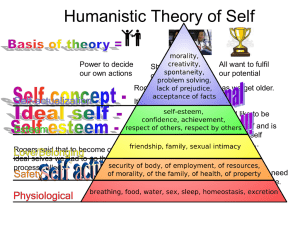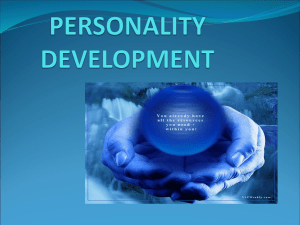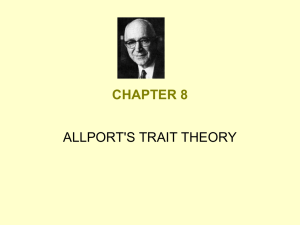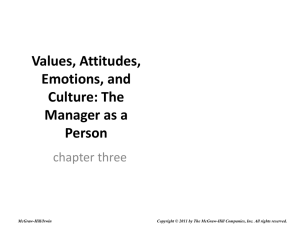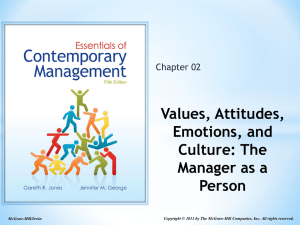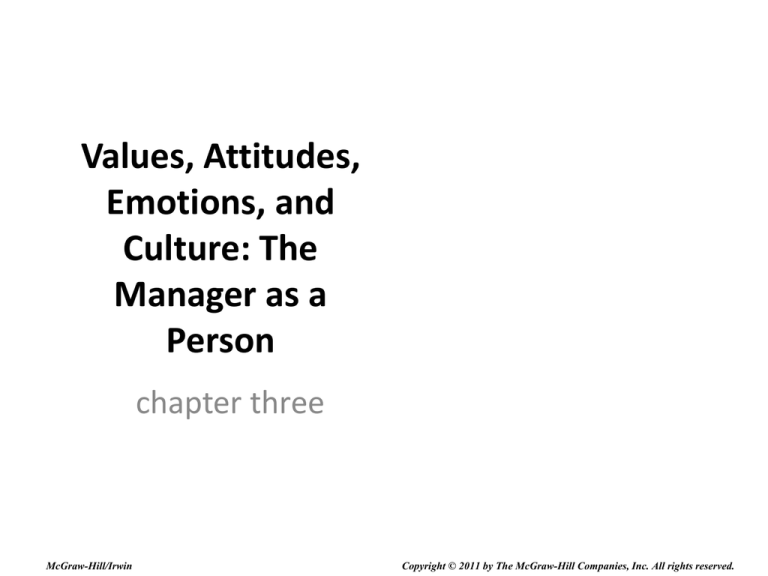
Values, Attitudes,
Emotions, and
Culture: The
Manager as a
Person
chapter three
McGraw-Hill/Irwin
Copyright © 2011 by The McGraw-Hill Companies, Inc. All rights reserved.
Learning Objectives
1. Describe the various personality traits that affect how
managers think, feel, and behave
2. Explain what values and attitudes are and describe their
impact on managerial action
3. Appreciate how moods and emotions influence all
members of an organization
4. Describe the nature of emotional intelligence and its
role in management
5. Define organizational culture and explain how managers
both create and are influenced by organizational culture
3-2
Personality Traits
• Personality Traits
– Particular tendencies to feel, think, and act in
certain ways that can be used to describe the
personality of every individual
• Manager’s personalities influence their
behavior and approach to managing people
and resources
3-3
Big Five Personality Traits
Figure 3.1
Page 88
3-4
Manager’s and Traits
• Personality traits that
enhance managerial
effectiveness in one
situation may actually
impair it in another
3-5
Big Five Personality Traits
• Extraversion
– tendency to experience positive emotions and
moods and feel good about oneself and the rest of
the world
– Figure 3.2, page 89
3-6
Big Five Personality Traits
• Negative affectivity
– tendency to experience negative emotions and
moods, feel distressed, and be critical of oneself
and others
3-7
Measure of Negative Affectivity
Figure 3.3
3-8
Page 90
Big Five Personality Traits
• Agreeableness
– tendency to get along well with others
• Conscientiousness
– tendency to be careful, scrupulous, and persevering
3-9
Big Five Personality Traits
• Openness to Experience
– tendency to be original, have broad interests, be
open to a wide range of stimuli, be daring and take
risks.
• HOMEWORK
– http://www.outofservice.com/bigfive/
3-10
Other Personality Traits
• Internal locus of control
– Belief that you are responsible for your own fate
– Own actions and behaviors are major and decisive
determinants of job outcomes
3-11
Other Personality Traits
• External locus of control
– The tendency to locate responsibility for one’s fate
in outside forces and to believe one’s own
behavior has little impact on outcomes.
– http://www.mindtools.com/pages/article/newCD
V_90.htm
3-12
Other Personality Traits
• Self-Esteem
– The degree to which people feel good about
themselves and their capabilities
• High self-esteem causes a person to feel competent,
deserving and capable.
• Persons with low self-esteem have poor opinions of
themselves and are unsure about their capabilities.
3-13
Other Personality Traits
• Need for Achievement
– The extent to which an individual has a strong
desire to perform challenging tasks well and to
meet personal standards for excellence
– http://www.wwnorton.com/college/psych/psychsci
/media/survey.htm
• Need for Power
– The extent to which an individual desires to control
or influence others
3-14
Other Personality Traits
• Need for Affiliation
– The extent to which an individual is concerned
about establishing and maintaining good
interpersonal relations, being liked, and having
other people get along
3-15


